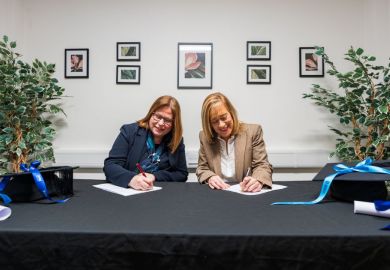Government funding for universities should be linked to the diversity of their student bodies, while institutions should stop cross-subsidising income from education to research, the founder of a hybrid university has claimed.
Ben Nelson, chairman and CEO of Minerva, said every university “makes a choice of how inclusive they want to be” and has “a responsibility to be stewards for society in the right way”.
“If you have a beautiful campus yet some of your students don’t have the appropriate technology to benefit from that, then you’ve made the choice to invest in something that is fundamentally exclusive as opposed to inclusive,” he said during a panel discussion hosted by the Economist Intelligence Unit on the future of higher education in a post-Covid-19 world.
He added that Minerva’s “trade-off” was to be fully needs-blind and have small class sizes, which has meant that the university as a whole has a small student population. Minerva's courses are delivered virtually but students live together in resident halls.
“Every institution has to make that set of choices,” he continued. “I think that government funding should be tied one way or another to the make-up of the student body, not necessarily for a prescribed make-up but just to verify that indeed universities are serving a public mission, if it is supposed to be publicly supported. And if it chooses not to, that’s fine – it just doesn’t need to have public support.”
During the debate, Mr Nelson also claimed that the notion “perpetrated by a number of universities” that the research mission of an institution is critical to its educational mission was “nonsense”.
“The reality is, if you have professors who understand research and can then teach students how to take research methodologies and approaches to pursue what they’re interested in…that’s actually what matters. The connection to the actual research that’s done at the institution is tenuous,” he said.
He added that institutions should be “honest with funders, primarily with governments, and not conflate” education and research.
“Don’t take money that governments allocate to educate students and steal that to do research. Instead, go to governments and make the argument that research is critical for the country, for society, for the world at large and get it funded separately,” he said. “Don’t have this cross-pollination, because it creates all sorts of moral hazard problems.”
Mary Schmidt Campbell, president of Spelman College, a historically black liberal arts college for women, who also spoke on the panel, said universities had to play a greater role in correcting inequalities in society, some of which have been laid bare by the coronavirus pandemic.
“As we are rethinking what our priorities are as educational institutions, for those of us who are in urban areas and much more locally based, as opposed to globally based, we have a real responsibility to become part of the solution that corrects an inequality that begins in early childhood education through K-12,” she said.
Dr Campbell gave the example of a programme at her institution in which 100 students helped local school pupils learn how to read.
“In two years, they materially changed the reading skills in this community,” she said. “Our colleges and universities have the capacity to be agents of that change themselves. You can do that for reading. You can do that for math. You can do that by bringing students on to campus early and beginning the college preparation. We can change some of the focus that we have, but we have to do that if we’re going to get to the foundation of righting these economic inequalities.”
Register to continue
Why register?
- Registration is free and only takes a moment
- Once registered, you can read 3 articles a month
- Sign up for our newsletter
Subscribe
Or subscribe for unlimited access to:
- Unlimited access to news, views, insights & reviews
- Digital editions
- Digital access to THE’s university and college rankings analysis
Already registered or a current subscriber?








